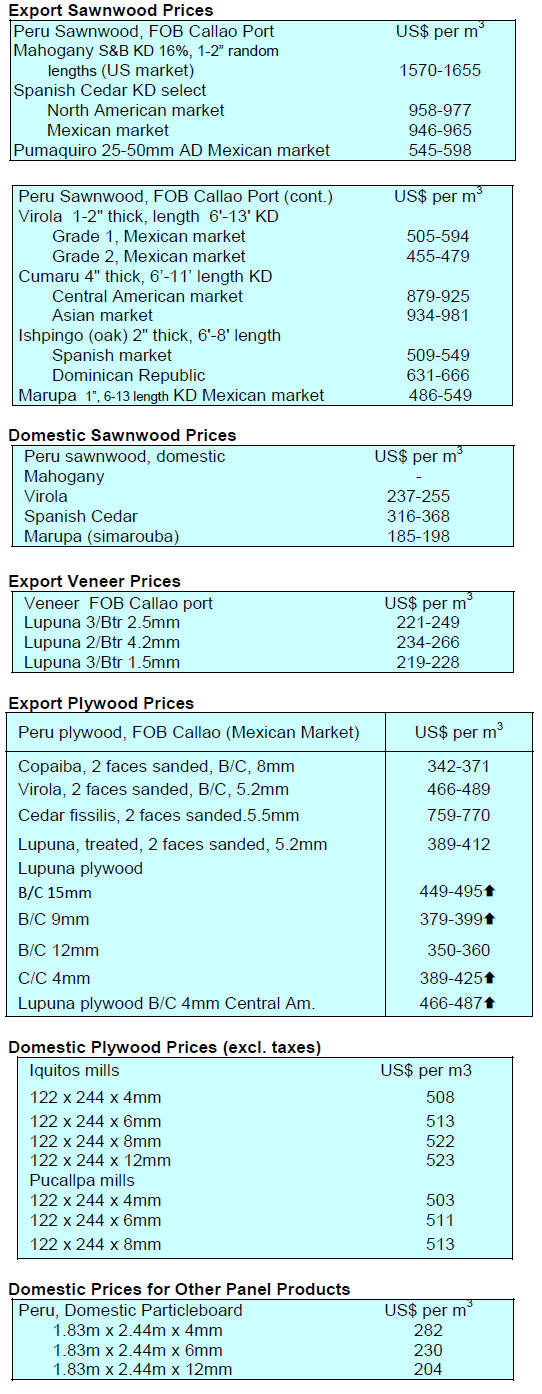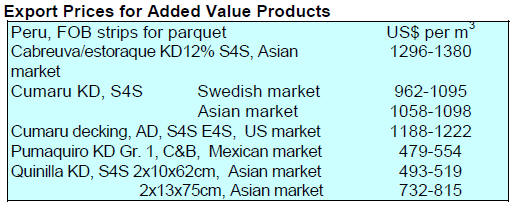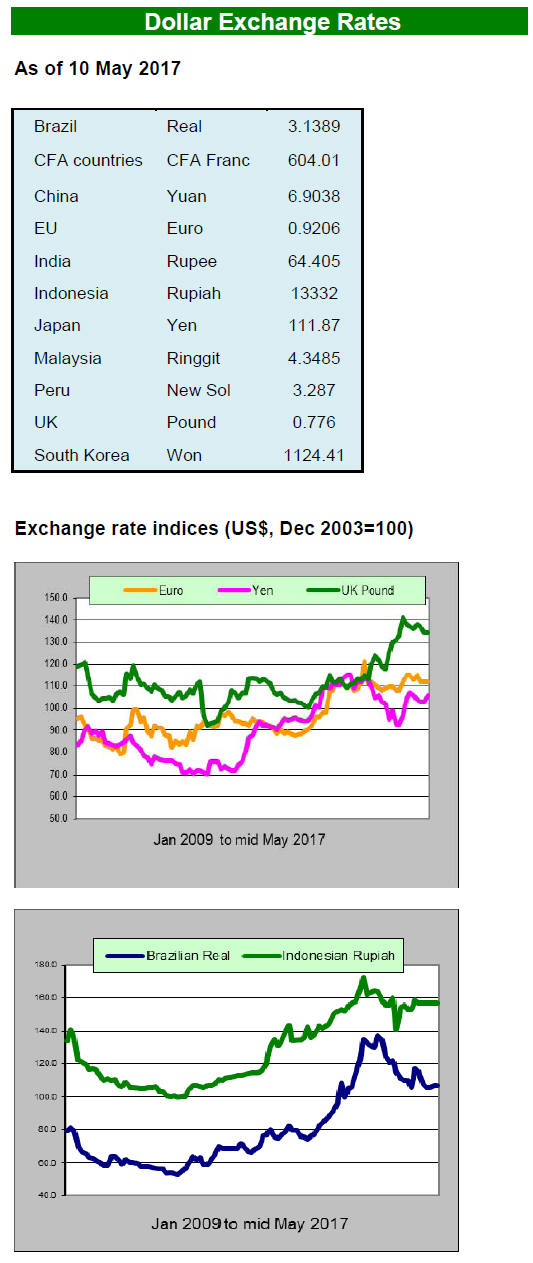2. GHANA
Rosewood trade ban lifted
The ban on trade in rosewood (Pterocarpus erinaceus) has
been lifted as mechanisms are in place to regulate
harvesting, processing and export according to the
Forestry Commission (GFC). At a recent press briefing,
the Deputy CEO of the GFC, John Allotey, said all
harvesting of rosewood would be based on quotas agreed
with CITES.
The felling of the species, commonly found in the three
northern regions of Ghana, started around 5 years ago
when the Forestry Commission allowed a few approved
companies to harvest and export rosewood. But, because
the timber is in such demand in international markets,
indiscriminate and illegal harvesting got out of hand such
that the species was under treat of extinction.
According to the minister’s statement, the lifting of the
ban is to enable companies to clear stocks already at the
ports and in depots across the country. Those companies
with stocks but whose harvesting was done without
approval will have to pay various penalties before they can
export rosewood stocks.
Development Bank for SMEs
The government has hinted of plans to set up a Business
Development Bank dedicated to meet the needs of SMEs
in the manufacturing sector. This was mentioned by the
Deputy Minister of Trade and Industries during the 2017
Ghana Manufacturing Award ceremony.
The expansion of domestic manufacturing has been
identified as a pillar of the government’s growth strategy
for the country.
In the past, wood product manufacturing was a
significant
contributor to Ghana’s GDP. Gold production and cocoa
exports were the main drivers of growth.
The contribution to growth of the wood products sector is
now a fraction of what it once was as the sector has been
hampered by raw material scarcity, power supply
problems, high interest rates and high production costs
which have undermined competiveness.
Support for natural resource management
The World Bank has offered Ghana funds to strengthen
local communities in the Western and Brong Ahafo
Regions of the country.
The funds will be used to strengthen community practices
towards reducing deforestation and improving sustainable
forest management. The project will contribute towards
helping the communities better understand REDD+
(Reducing Emissions from deforestation and Forest
degradation plus conservation of Forest, Sustainable
Forest management and Enhancement of Forest Carbon
Stocks).
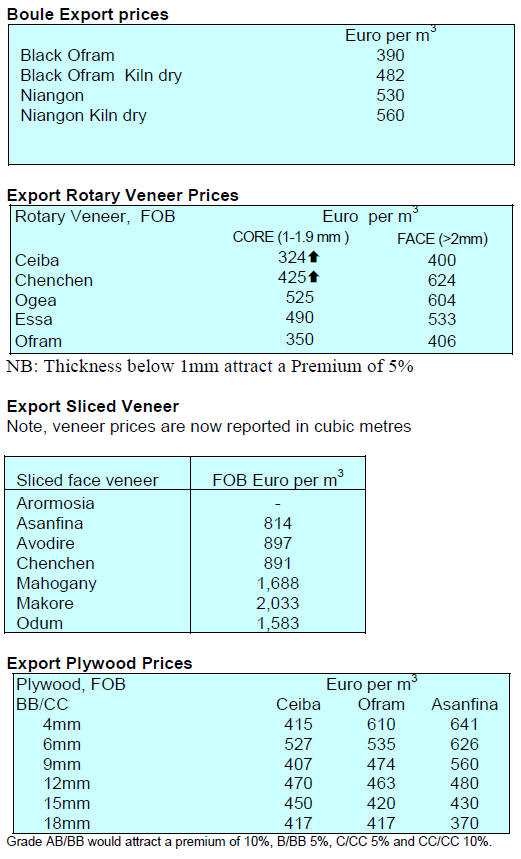
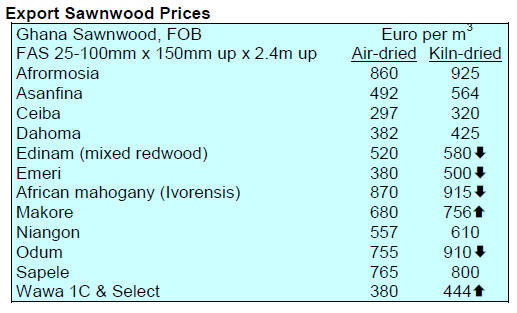
3.
SOUTH AFRICA
Indicators suggest economy slowing
BankservAfrica’s Economic Transaction Index (BETI) for
April has been reported in the domestic press showing that
economic transactions conducted in April declined by
close to 2 percent.
This downturn reflects the impact of the April holidays but
may also signal a slowdown in the economy. The March
index suggested a strengthening domestic economy and
was the third consecutive month of positive growth.
See: www.bankservafrica.com/Press-Office/Month/4/Year/2017
Political uncertainty in the country is impacting both
consumer and business sentiment say analysts. Market
demand remains weak, contracts being placed are for
smaller volumes and for shorter durations and the pace of
enquiries has slipped. Part of the problem is that
government budgets for infrastructure are not being
offered.
On top of this, consumers show no interest in spending
and are holding onto their disposable incomes which have
taken a hit because of the recent fuel price increase due to
the weaker rand.
The private housing market is very quiet as the price
premium for a new home compared to a second hand
home is still over 30% and the prospect of higher interest
rates is of concern to prospective buyers.
Slow construction spending undermines demand
Subdued demand in the construction sector is impacting
pricing. In the pine market there has been a bout of
aggressive discounting by mills as some roof truss plants
are standing idle.
American hardwoods are still moving but there has been
some discounting, especially of 25mm white oak, and the
volumes being purchased have fallen as some furniture
manufacturers are using more veneered boards.
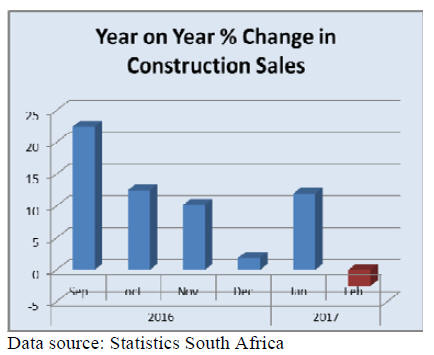
Analysts report that stocks are building up at
panel
producers due to falling consumption.
The meranti market is also soft, driven down by the
weaker property market There has been some discounting
as traders reduce their stocks in line with market
requirements. The market for okoume faces the same
challenges.
Regional marketing a real challenge
When South African domestic markets are quiet eyes turn
to regional markets but there are few prospects it seems.
Analysts report that in Zimbabwe there is an acute
shortage of cash notes again.
There are reports of drivers being unable to get notes to
pay the road tolls - everyone is turning to credit cards.
More importantly importers are really struggling to have
access to funds.
Angola still faces a revenue crisis even though oil prices
have moved firmer recently. In Zambia the government is
insisting they use their own pine and eucalyptus resources
rather than imported wood.
Malawi has extensive plantations and is not a significant
market for South African producers. Malawi produces
wide range of products from its plantations and the
country has hardwoods such as panga panga (Millettia
stuhlmannii), ebony and kiaat (Pterocarpus angolensis). In
addition Malawi has some rubberwood plantations.
Also in the east, Tanzania is basically self-sufficient in
timber and they sell teak to India. What was once a
lucrative market, Mauritius, is now very quiet as the
property market has basically stalled.
4.
MALAYSIA
Cabotage policy revised
From 1 June this year companies shipping goods from
Peninsular Malaysia to Sabah, Sarawak and Labuan will
no longer be required by law to Trans-ship in Port Klang
and use Malaysian registered vessels to move goods
onward. The Malaysian Prime Minister announced the two
States and Labuan would be exempted from the cabotage
policy.
Under the earlier cabotage policy, goods destined for
Sabah, Sarawak and Labuan had to be trans-shipped at a
Peninsular Malaysia port (Port Klang) to a Malaysian
registered vessel.
The cabotage policy was introduced in the 1980s as a way
of promoting Port Klang as the country’s main transshipment
hub. The policy required goods from outside the
country to go first to Port Klang before being shipped to
Sabah, Sarawak and Labuan. This policy has been blamed
for the high costs of goods in Sabah, Sarawak and Labuan
compared to prices in Peninsular Malaysia.
Malaysia/EU FTA
Negotiations on a Free Trade Agreement (FTA) between
Malaysia and the EU have resumed. In September 2010
the EU member states approved the launch of negotiations
for a FTA with Malaysia. One month later, negotiations
were launched in Brussels but after seven rounds,
negotiations were put on hold in April 2012 at Malaysia's
request.
EU is the third largest trading partner for Malaysia and the
latest statistics from the Malaysian Timber Industry Board
(MTIB) show exports of wood products in January 2017
were worth RM 1,938 million accounting for just under
10% total wood product exports.
The FTA negotiations between Malaysia and the European
Union (EU) will include a discussion on the recent
resolution by the EU parliament to phase out the use of
certain vegetable oils, including palm oil, by 2020.
Massive increase in log cess in Sarawak
The Sarawak state government has announced an increase
in the log premium (cess) charge from RM0.80 to RM50
per cubic metre. The cess of RM0.80 was introduced in
1986 and was never reviewed.
This decision sent shock waves through the Sarawak
timber sector and companies are calling for the decision to
be reviewed as they fear it will undermine their
competitiveness because production costs will rise. A
response from CIMB Equities Research suggested that the
planned increase in cess could result in a 14% increase in
production costs.
See: http://www.theborneopost.com/2017/05/10/putting-footdown-
on-log-premiums/
Concessionaires in the Heart of Borneo area must
secure certification
The Heart of Borneo (HoB) initiative, a voluntary transboundary
cooperative project involving Malaysia,
Indonesia and Brunei, is an effort to conserve and protect
one of the most diverse natural ecosystems and the largest
contiguous tropical rainforests in Southeast Asia. The
Malaysian states involved are Sabah and Sarawak.
To ensure the forests in the HoB area are sustainably
managed, the Sarawak state government has directed
timber concession operators in the area to obtain forest
management certification by July this year.
Plywood export prices
Plywood traders in Sarawak reported export prices:
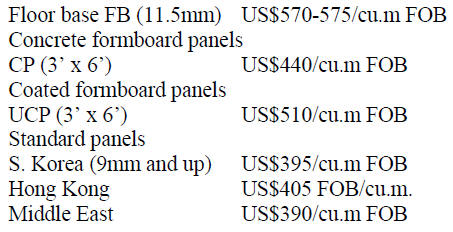
5. INDONESIA
Wood product manufactures must not relax
International Industry and Trade Advisor to the Minister
of Environment and Forestry, Laksmi Dewanthi, has said
while Indonesia was successful in becoming the first
country to earn the right to issue FLEGT licenses wood
product manufacturers cannot relax.
He said the forestry sector must carefully monitor progress
in other countries towards FLEGT licenses as competition
will mount which means industry must continually make
improvements to productivity and product lines.
In related news the Director of Forest Product Processing
and Marketing in the Ministry Environment and Forestry,
Rufi'ie, mentioned that since the launch of the FLEGT
licensing scheme Indonesia has issued 14,548 licenses for
the wood product exports to the European Union.
Rufi'ie reported that during 2016 the export value of wood
products to all countries reached US$9.26 billion and for
the first quarter 2017 the value of exports topped US$1.75
billion.
So far this year furniture exports have been very
successful. In 2016 exports to EU were worth US$800
million and in the first three months after FLEGT licenses
were issued exports were already US$300 million.
Indonesian crafts need marketing boost
Speaking at the 2017 International Handicraft Trade Fair
(Inacraft) in Jakarta, Indonesian President, Joko Widodo,
said the craft industry needs a marketing boost in order to
lure international buyers. He emphasised that Indonesia
has quality crafts but quality alone is not enough.
The President suggested that Indonesian craft makers
should pay attention to three aspects, product
specification, pricing and timely delivery. He also
emphasised that attractive and functional packaging was
an important element in attracting buyers.
Furniture from recycled wood an opportunity
The Indonesian Furniture and Handicraft Association is
encouraging its members to think about using local
recycled wood for export furniture as this type of furniture
is a niche market in Europe and the US.
Endro Wardoyo, a member of the Indonesian Furniture
and Crafts Industry Association (HIMKI), said she had
experienced buyers looking in Indonesia for such unique
furniture as they cannot find it in neighbouring countries.
According to Endro, recycled furniture of a rustic design is
popular in Europe and America.
Peatland restoration plan will impact viability of
plantation investment
Chairman of the Association of Indonesian Entrepreneurs
in Riau Province (Apindo), Riau Wijatmoko Rah Trisno,
has expressed the view that the Government Regulation
No. 57 of 2016 on Protection and Management of Peat
Ecosystems could undermine the competitiveness of
products derived from industrial plantation Forest (HTI).
His main concern seems to be that the land swap feature of
the Regulation may not be a viable solution in many cases.
Apindo, in Riau Province, is also concerned that some
20,000 workers in the industrial timber plantation (HTI)
sector could lose their jbs as a result of the new
Regulation.
According to Wijatmoko, there are 3,400 direct workers
and 17,000 indirect workers/sub-contractors in the HTI
sector that could be affected.
The new peatland regulation calls for HTI concessionaires
to allow the area to recover as peatland once the forest
plantation has been harvested. This, says Apindo, will
undermine the financial viability of the plantation
investment.
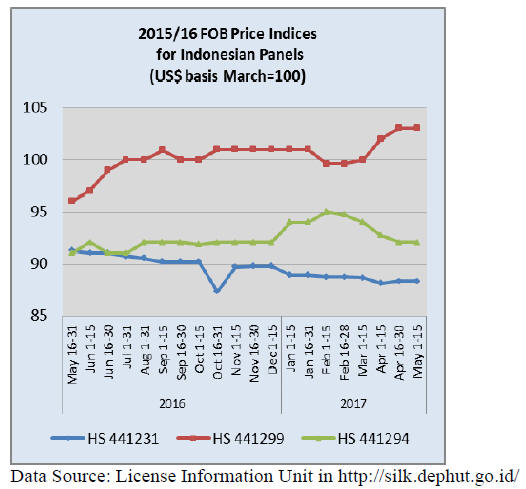
6. MYANMAR
Corruption and poverty driving illegal
activities
According to the Sagaing Region Forestry Department,
corruption, poverty, limited employment opportunities and
high market demand are the causes of illegal felling and
deforestation. Sagaing has 160 reserved forests and 87
protected forests which need constant guarding.
Sagaing Region and Shan State have experienced the
worst illegal felling and the authorities have reported the
seizure of around 50,000 tons of illegally harvested logs in
the border area.
The operations of the Forestry Department and police in
the two worst affected areas are not without risk.
According to the Minister, Forestry staff were recently
attacked while apprehending suspects. For fiscal 2016-17
8,321 suspected smugglers have been held.
MTE operations to be open and transparent
Ohn Win, Minister for Natural Resources and
Environmental Conservation, has said his ministry is
committed to provide complete transparency in the
operations of the Myanma Timber Enterprise (MTE).
He said members of parliament and civil-society
organisations will be invited to observe the entire process
under MTE management from felling, transport and sale.
He said an open system will begin in this fiscal year. This
move comes as the ministry attempts to reassure
international buyers that the origin of Myanmar’s wood
products can be tracked and verified legal.
Stiffer penalties for offenders
In another development, the Mandalay Regional
Government has said it intends to bring criminal charges
to those involved in illegal activities in the forest. This
would be over and above the actions taken under the
existing Forestry laws.
Analysts report that the Forestry Department is
disappointed with the lenient sentences handed down on
those guilty of illegal felling and smuggling. New penalty
structures have been decided.
For illegal teak harvesting if the quantity is less than one
ton the suspect will be charged under the Forestry Law, if
the quantity is between 1 to 3 tons then prosecution will be
governed by the Public Property Act and for over 3 tons
then the Protection of Public Property Act will be applied.
The FD has issued guidelines for pricing for export
according to the type of product; the price is set depending
on the market destination. It appears a two tier system will
be applied depending on the market.
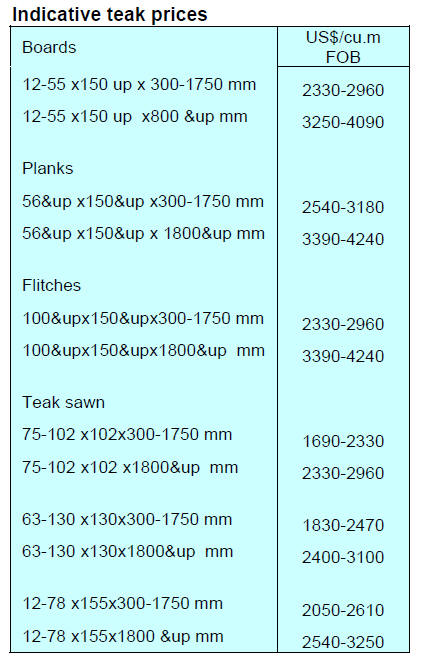
7. INDIA
ESCAP survey optimistic on India
The ‘Economic and Social Survey of Asia and the Pacific
2017’ published by the UN Economic and Social
Commission for Asia and the Pacific (ESCAP) says
India’s economic growth is projected at 7.1% in 2017
rising to 7.5% in 2018 on the back of higher consumption
and increased infrastructure spending.
But ESCAP warns the concentration of bad loans in public
sector banks is a risk and there will be a need to
recapitalise the public sector banks.
See: http://www.unescap.org/publications/economic-and-socialsurvey-
asia-and-pacific-2017
Finance scheme for affordable homes agreed
The Confederation of Real Estate Developers’
Associations of India (CREDAI) and the State Bank of
India (SBI) have agreed to work together to make the
government’s ‘Housing for All’ plan a reality. The plan
calls for building affordable homes.
SBI is the largest bank and mortgage lender in India and
the agreement between SBI and CREADAI will deliver
construction finance at competitive rates to CREDAI
members for eligible affordable housing projects.
SBI and CREDAI had previously agreed to work together
on ‘Green Construction’ through which SBI will offer
concessionary rates on loans for the construction of green
projects.
See: http://credai.org/press-releases/sbi--credai-cometogether-
for-sustainable-development-and-affordablehousing
Calls to make selling logs from private land easier
The central government has proposed that states should
reconsider current regulations which severely limit the
felling and sale of timber from private land. This, says the
central government, would provide extra income to
farmers and help reduce dependence on imports of wood
products.
To begin effecting a change the Ministry of Environment,
Forest and Climate Change has written to states seeking
suggestions for expanding private agro-forestry investment
and on how to ease regulations on the sale and transport of
timber from private land.
For the full story see:
http://timesofindia.indiatimes.com/india/government-push-fortrade-
in-timber-on-private-land/articleshow/58542563.cms 2/4
Western India auction prices down slightly
Between 4-11 April, auctions were conducted at various
forest depots of the North and South Dangs as well as the
Valsad Divisions.
Approximately 2,500 cubic metres of teak logs were
offered along with around 1,000 cubic metres of other
hardwood logs such as Adina cordifolia, Gmelina arborea,
Pterocarpus marsupium, Acacia catechu and Mitragyna
parviflora.
As imported plantation teak logs are mostly of small girth,
buyers were interested in the higher girth domestic teak
and these logs attracted good prices. However, analysts
report prices at the April auctions were lower than at the
most recent auctions in the same divisions.
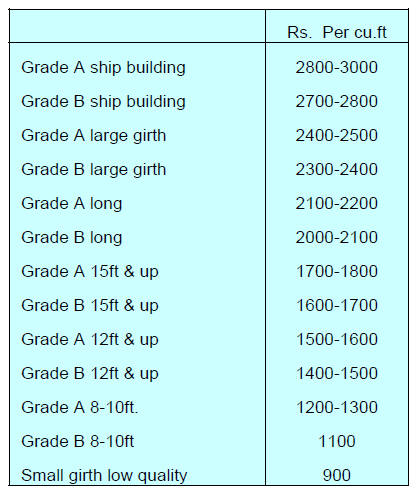
Good quality non-teak hard wood logs attracted lower
prices than at the previous auction. Logs 3 to 4 m. long
with girths of 91 cms and up of Haldu (Adina cordifolia),
laurel (Terminalia tomentosa), kalam (Mitragyna
parviflora) and Pterocarpus marsupium, attracted bids of
around Rs.700 to 750 per c.ft. Second quality logs of the
same species attracted prices from Rs.350 to 500 per c.ft
while the lowest quality logs sold for from Rs.200 to 300
per .cft.
Imports of plantation teak
The supply of imported plantation teak remains steady and
the stronger rupee is helping importers hold down landed
costs.
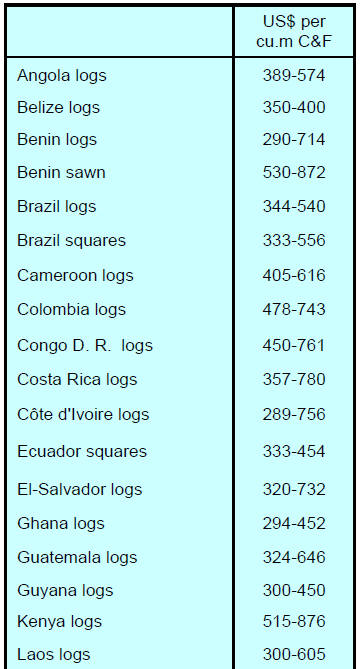
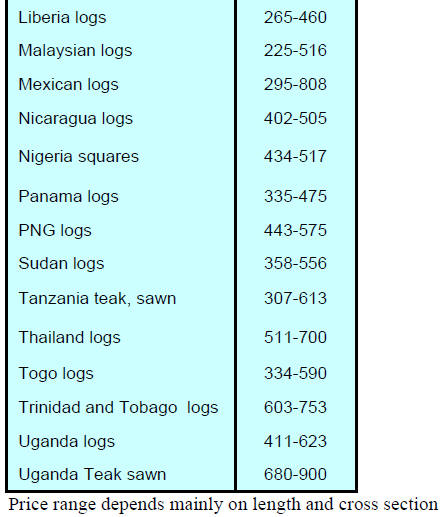
Imported sawn hardwood prices
Prices for domestically milled sawnwood have not
changed, except in the case of red meranti where ex-mill
prices have increased by about Rs.100 per c.ft. The price
rise for meranti, say analysts, is related to higher FOB
prices as well as firming domestic demand.
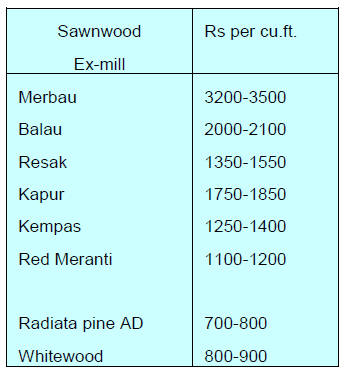
Stocks of Myanmar teak sustaining Indian mills
Indian millers are still able to secure Myanmar teak logs
from stockists in Taiwan P.o.C and other countries that
built up log stocks before the export ban in Myanmar.
However, as stock decline the firm demand is beginning to
drive prices higher.
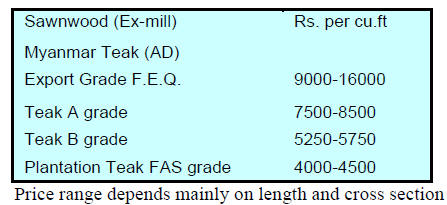
Prices for imported sawnwood
Demand for imported sawnwood is firm but importers
have been able to maintain prices as they have benefitted
from the stronger rupee.
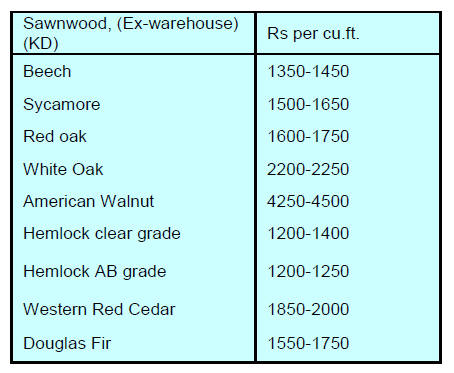
Plywood prices increased to off-set higher
production
costs
Demand from plywood mills for logs has firmed as many
of the older mills are seeking additional supplies of logs
and veneer to feed recently installed extra processing
equipment. This, and steady demand, is driving up prices.
Since the end of April plywood prices have increased
between 5-6%, a significant and welcome rise for
manufacturers.
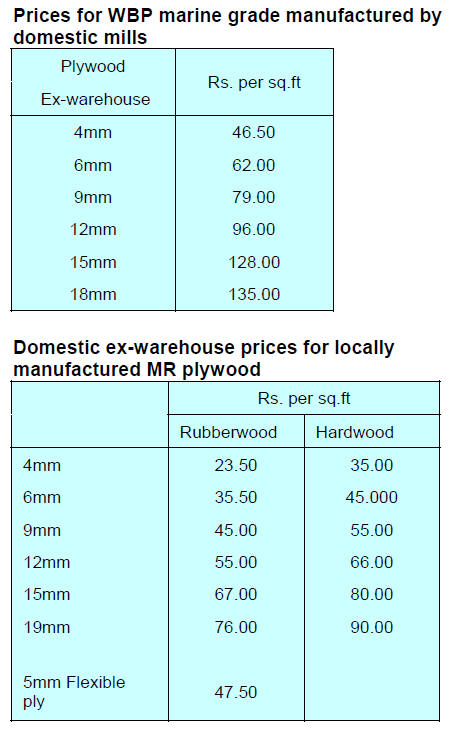
8. BRAZIL
Use timber to help to preserve forests –
WWF-Brazil
A recent story published by Agęncia Brasil (ABR), the
national public news agency, says WWF-Brazil has
declared deforestation in the Amazon is linked mostly to
cattle ranching and agriculture expansion and that
sustainable management for timber and environmental
services helps to preserve the forest. However, says
WWF-Brazil, it is necessary have robust systems for
tracking the source of timber and to consider certification.
WWF-Brazil is seeking to correct the impression that
wooden frame houses are inferior and wants to
demonstrate that technologies are available to process and
treat wood making it an excellent building material.
Standards association evaluates wood frame rules
In mid-April Brazilian Association of Technical Standards
(ABNT) committee responsible for developing the
technical standard for wood frame construction
(ABNT/CE-002: 126.011) met to evaluate progress in
implementation and to further refine the content of the
standard.
A decision was taken to extend the scope of the standard
to cover wooden buildings of up to two floors.
Issue of land ownership by foreign companies
addressed
In August 2010, a legal opinion from the Federal Attorney
General’s Office, indicated that legislation at that time
prohibited international groups from gaining control of
land in the country. This was rightly seen as a major
handicap to attracting foreign investment in forestry and
agriculture.
Recently, text for a new law that addresses land sale to
non-Brazilians (Law nš 4,059/2012), was submitted to the
Federal Government and Chamber of Deputies by a
commission called the Parliamentary Front for Forestry
(FPS). It is anticipated that the new text will be approved
within a few months.
The new draft bill removes the limit on the direct purchase
of land by international groups, except in the border areas,
legal reserve areas and areas in the Amazon biome.
However the new law will require that companies have a
Brazilian controlling shareholder. According to FPS, the
new draft bill does not allow the land to be bought by
sovereign wealth funds, state-owned enterprises and nongovernmental
organizations.
Raising competitiveness of the forest industries
The Brazilian Association of Mechanically-Processed
Timber Industry (ABIMCI) has promoted and participated
in several meetings with strategic institutions aimed at
identifying measures necessary to improve the
international competitiveness of the forestry sector.
Among the most recent meetings was one with the
Ministry of Development, Industry and Foreign Trade
(MDIC) at the preparatory meeting of the Brazil/United
States Business Council. The objectives of this meeting
were to discuss production in the sector and examine:
 opportunities for partnerships in
foreign trade,
opportunities for partnerships in
foreign trade,
 removal of technical and commercial
barriers to
removal of technical and commercial
barriers to
trade,
 mutual recognition agreements,
mutual recognition agreements,
 product standardisation,
product standardisation,
 innovation
innovation
and
 incentives to the creation of a single
export/trade
incentives to the creation of a single
export/trade
information portal and revision of the
Generalized System of Preferences (GSP).
ABIMCI has also conducted seminar on the foreign trade
and the forest products industry specifically addressing
topics such as exports as priority action for companies; the
economic perspective of foreign trade; evaluation of
Brazil-Argentina bilateral trade and the possibilities of
strengthening MERCOSUR for expanded trade relations.
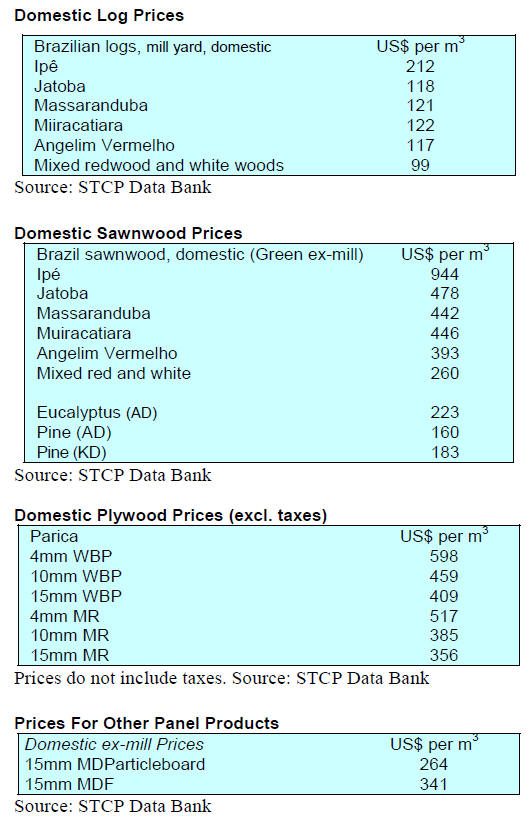
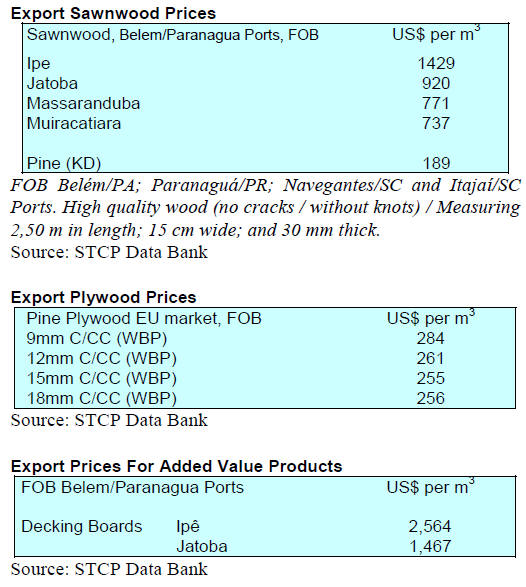
9.
PERU
Use more wood for reconstruction in disaster
areas – ADEX
Since December last year Peru has been affected by
adverse weather blamed on the El Niņo effect. There has
been very heavy rainfall, floods, landslides, hail and
storms. The worst affected areas are in the northern coastal
regions but there are reports of damage in all 24 of the
country’s administrative departments. As of 21 April
reports indicate some 1.2 million people have been
affected.
The reconstruction of homes, a priority in the north of the
country, can be speeded up if locally available timber from
the Peruvian Amazon is used said Erik Fischer, Chairman
of the Committee of Wood and Wood Industry of the
Association of Exporters (ADEX).
He pointed out that in the US, Germany, Belgium,
Switzerland and Scandinavian countries wood is the
predominant material in housing construction. This, he
said, should encourage the government to place a priority
on the construction of wooden homes as this will boost the
local production of wood products and offer a quick
solution in the disaster hit areas.
Looking at the broader perspective, Fischer was of the
view that the country needs a housing policy that
emphasises the use of domestically available resources
such as timber.
He added that timber frame homes can be built more
cheaply than the traditional cement block or concrete
buildings.
